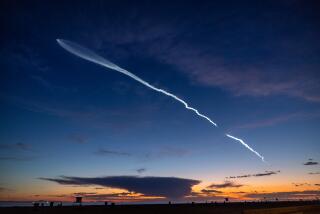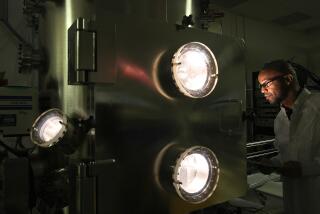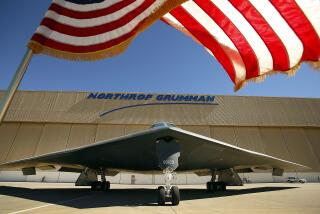Northrop Grumman aims for space with $7.8-billion bid to buy Orbital ATK
With its $7.8-billion bid to buy Orbital ATK Inc., Northrop Grumman Corp. is betting that the militarization of space and missile defense will get increasing attention — and dollars — from the Pentagon.
Orbital, based in Dulles, Va., has developed several small to medium-sized rockets that can hoist payloads into space. The company also makes small satellites.
Northrop is best known for its bombers, drones and other military equipment. It built the B-2 bomber in Palmdale and has a contract to build the follow-up B-21 fleet, which could eventually cost more than $80 billion. But it also makes satellite components and has manufactured large satellites. The Falls Church, Va., firm is constructing the James Webb Space Telescope, an $8.8-billion spacecraft with a 21-foot-diameter mirror that is set to capture the oldest light in the universe.
“It’ll be a juggernaut of an aerospace company,” said Phil Smith, space industry analyst at consulting firm Bryce Space and Technology. “You’ll have basically a full suite of space capabilities.”
In a call with analysts Monday morning, Northrop Chief Executive Wes Bush described Orbital’s capabilities as “very complementary.” Northrop executives singled out space, missiles and missile defense as areas where the deal could create new opportunities and offerings for customers.
“We’ve had a chance to work directly with Orbital ATK over the years on a variety of programs as partners,” Bush said on the call. “That has given me a very high level of confidence in the discipline within that organization because we’ve seen them perform exceptionally well on everything where we’ve been partnered.”
The deal must pass regulatory review and approval by Orbital shareholders.
Northrop probably was interested in Orbital for several reasons, including Orbital’s steadily improving financial results and its dominance in areas with few competitors, including large solid-fuel rocket motors, which would be used to launch intercontinental ballistic missiles, and liquid-fuel rocket engines, said Loren Thompson, aerospace analyst at the Lexington Institute think tank.
Last year, Northrop reported net income of $2.2 billion on revenue of $24.5 billion, while Orbital had net income of $292.2 million on revenue of $4.5 billion, according to the companies’ annual reports.
Thompson said the deal answers the question of what’s next for Northrop.
“Northrop is doing fine, but it wasn’t clear what their strategy was for the future,” said Thompson, whose think tank receives some money from Orbital. “What this suggests is they’re making a bigger commitment to space.”
The Pentagon has become increasingly concerned about the vulnerability to attack of large, expensive national security satellites used for surveillance and communications, said Philip Finnegan, director of corporate analysis at Teal Group, an aerospace and defense market research firm.
“You don’t want to rely too heavily on large, expensive satellites,” he said. “You also want smaller, less expensive satellites, so there’s a disaggregation of capabilities. That’s one area the two companies fit together.”
Orbital’s rocket lineup ranges from the smaller Pegasus rocket, which can be attached to the belly of the company’s Stargazer L-1011 airplane and launched while the plane is in flight, to its Antares medium-class launcher.
Orbital has a NASA contract to ferry supplies via its Antares rocket to the International Space Station.
The company planned to add more capabilities to its lineup with its first intermediate and heavy-lift rockets, known for now as the Next Generation Launcher, or NGL.
The NGL rockets are still being developed, but Orbital hopes to eventually get them certified by the U.S. Air Force to compete for lucrative national security launch contracts. United Launch Alliance, a joint venture of Boeing Co. and Lockheed Martin Corp., and Elon Musk’s SpaceX are the only two launch providers currently certified to compete for those contracts.
Analysts said they couldn’t predict whether Northrop would continue development on the NGL rockets.
Missile defense, as well as the implications for the new ICBM program, were probably also major factors in the acquisition, analysts said.
Orbital makes rocket motors that power missiles, and it designs and produces target launch vehicles that are used to test missile defense systems.
The company also makes the interceptor boosters for the U.S. Ground-based Midcourse Defense system, the nation’s primary protection against a missile strike.
Northrop — along with competitor Boeing — recently was chosen by the Air Force to continue work on designs for a new intercontinental ballistic missile system known as the Ground Based Strategic Deterrent program. Orbital is part of both companies’ bids, though an Orbital spokesman said it keeps a “strict firewall” in place.
A Boeing spokesman said the company plans to review the transaction before making any comments.
“There’s going to definitely be more interest in missile defense in the future,” said Finnegan of Teal Group. “This acquisition makes Northrop Grumman much more of a player than it had been in the past.”
Northrop’s acquisition of Orbital is a sign of further consolidation in the aerospace and defense sector, which has been aided by a run-up in the value of aerospace stock prices.
Orbital itself was created in 2015 when Orbital Sciences Corp. combined with Alliant Techsystems Inc.’s aerospace and defense groups.
The deal comes on the heels of the $23-billion acquisition of aviation communications and electronics supplier Rockwell Collins Inc. by United Technologies Corp., announced earlier this month.
The Northrop-Orbital deal is expected to close in the first half of 2018. Orbital shareholders are to receive $134.50 a share in cash, a 22.2% premium over Friday’s closing price. Northrop is to assume $1.4 billion in net debt.
Northrop has just over 25,000 employees in California, with major facilities in Redondo Beach, Palmdale, El Segundo and Rancho Bernardo.
Orbital has just under 1,000 employees in California, with most of those in Southern California. The company’s main facilities in the state include launch systems at Vandenberg Air Force Base, space components in San Diego, solar arrays in Goleta and defense electronic systems in Northridge.
Orbital CEO David Thompson said in the Monday call that operating management teams and the company’s workforce will be kept in place, though final decisions on sector leadership have not yet been made.
Orbital’s stock closed at $132.25 a share Monday, up 20%. Northrop shares closed at $275.97, up 3%.
Twitter: @smasunaga
ALSO
Roku aims to raise $252 million with IPO
Slacker Radio agrees to be acquired by LiveXLive for $50 million
UPDATES:
4:20 p.m.: This article has been updated throughout with analysts’ comments and closing stock prices.
9 a.m.: This article was updated with with stock prices and more details from executives’ conference call with analysts.
8:05 a.m.: This article was updated with comments from analyst Loren Thompson.
6:40 a.m.: This article was updated with details from executives’ conference call with analysts.
This article was originally published at 4:50 a.m.







